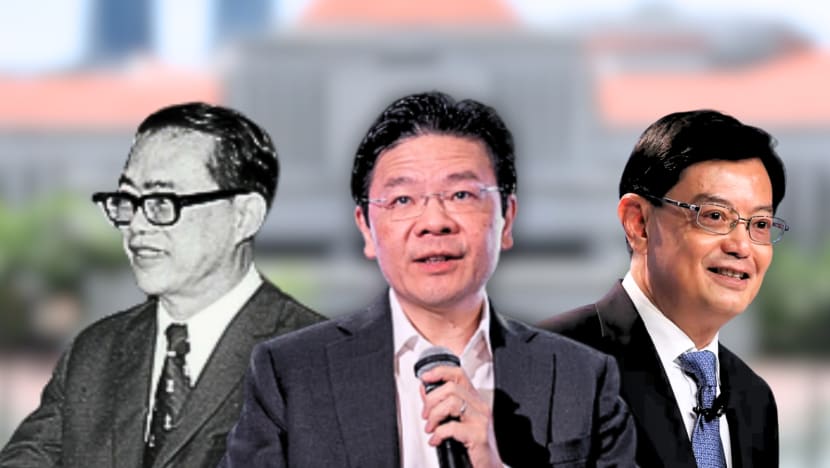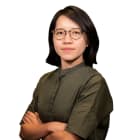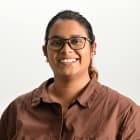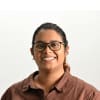GE2025: Why Singapore's high-flying bureaucrats are recruited into politics
In recent weeks, top ministry officials have resigned, fuelling speculation they could be fielded as potential candidates for the ruling People's Action Party in the 2025 General Election.

(from left) Former Finance Minister Hon Sui Sen, Prime Minister Lawrence Wong and Deputy Prime Minister Heng Swee Keat are among key political figures in Singapore who were once civil servants. (Photos: DBS, Facebook/Lawrence Wong, Reuters)

This audio is generated by an AI tool.
SINGAPORE: Before he was elected into parliament, Mr Lee Yi Shyan worked in a ministry and three statutory boards, capping off his public service career as chief executive of what was then International Enterprise or IE Singapore.
For the former senior minister of state, making the move to politics was about having "a higher platform to make greater contributions".
"Singapore is an accidental country. To sustain this tiny nation, every one of us should give our best and make a contribution. It is not just for ourselves but for the next generation," Mr Lee told CNA.
In recent weeks, the reported resignations of six senior public servants have - like it did with Mr Lee in 2006 - led to speculation that they could become candidates for the ruling People's Action Party (PAP) in the coming General Election (GE).
Among them was Mr Jeffrey Siow, second permanent secretary at the ministries of manpower as well as trade and industry; and Ms Goh Hanyan, a director in the Ministry of Digital Development and Information.
It remains to be seen if all of these former public servants go on to contest in GE2025 - but if they do, the number is more or less in line with previous GEs.
At the last GE in 2020, five out of 27 new faces - about 19 per cent - fielded by the PAP were public servants, excluding those from the Singapore Armed Forces.
The equivalent numbers were four out of 24 (17 per cent) at GE2015; and seven out of 24 (29 per cent) at GE2011.
The ruling party’s history of mining political talent from both the military as well as the public service - which encompasses the ministry-only civil service and other government agencies like statutory boards - goes back decades.
Post-independence, the late Hon Sui Sen was perhaps the most prominent pioneer of this career pathway. He was a permanent secretary in the Finance Ministry, then the Economic Development Board’s first chairman before entering politics in 1970 and rising to become finance minister.
It was Mr Hon who approached Mr Goh Chok Tong to enter politics in 1976. Before eventually becoming Singapore’s second prime minister from 1990 to 2004, Mr Goh was a Public Service Commission (PSC) scholar who started his career in the civil service with the then-Economic Planning Unit.
Current Prime Minister Lawrence Wong was also in the public service for 14 years before entering politics in 2011.
"It fits the mould that the PAP is comfortable with," said Mr Inderjit Singh, a former PAP Member of Parliament (MP) from 1997 to 2015, who was an entrepreneur before politics.
But he also pointed to potential issues such as groupthink, when public servants familiar with the government become lawmakers themselves.
"Also, not questioning – the attitude of 'if it is not broken, why fix it'," said Mr Singh. "I doubt there will be a culture of challenging decisions when too many of them come from the same background."
GE SEASON SIGHTINGS
The public servants who quit recently are all slated to leave their jobs in the first few days of April, according to media reports.
Apart from Mr Siow and Ms Goh, the departures of Health Ministry deputy secretary Jasmin Lau, Transport Ministry director Foo Cexiang and MOF director Shawn Loh have been reported by The Straits Times.
The newspaper on Wednesday (Mar 26) also reported the expected resignation of Mr Dinesh Vasu Dash, chief executive of the government’s Agency for Integrated Care which is under the health ministry.
Mr Dinesh has been seen working the ground in Nee Soon and Holland-Bukit Timah GRCs, while Ms Goh was spotted at a Meet-The-People Session in the latter constituency on Mar 17.
The Straits Times speculated that all six could stand in the coming elections, without citing its sources.
CNA has asked the public servants about their next course of action. CNA has also asked the PAP if they will be fielded as candidates.
Former public servants typically become party members "immediately" after leaving the service, according to Mr Singh, noting it as a necessary step to stand for election.
Some of them may have had a longer association with grassroots leadership, but others may begin walking the ground only after resigning and joining the PAP, said Mr Terence Ho, adjunct associate professor in practice at the Lee Kuan Yew School of Public Policy (LKYSPP).
The opposition has also had candidates from the public service, though far fewer in numbers.
Prominent public servants turned political candidates
GE2020
Senior Minister of State for Digital Development and Information and National Development Tan Kiat How stepped down from his post as chief executive of the Infocomm Media Development Authority to make the jump into politics in 2020.
Senior Minister of State in the Prime Minister’s Office Desmond Tan was chief executive of another statutory board, the People's Association (PA), before leaving public service the same year.
Mr Eric Chua, who’s now senior parliamentary secretary for culture, community and youth and social and family development, came from a background in the Singapore Civil Defence Force. He was also previously a director at the Home Affairs Ministry.
Among the backbenchers, there’s Mr Yip Hon Weng, a former group chief of the Silver Generation Office under MOH. He was also a PSC scholar.
Ang Mo Kio GRC MP Ms Ng Ling Ling was also chief of future primary care and director of community engagement at the MOH Office of Healthcare Transformation.
In the opposition camp, Non-Constituency MP Leong Mun Wai from the Progress Singapore Party was also a government scholar under the PSC’s Overseas Merit Scholarship. He started his career with the Government of Singapore Investment Corporation or GIC, before moving on to work with global investment banks.
GE2015
At the 2015 election, Transport Minister Chee Hong Tat made his political debut after 17 years in public service. Another PSC scholar, he was a principal private secretary to founding Prime Minister Lee Kuan Yew, a CEO of the Energy Market Authority (EMA) and also a second permanent secretary at the Ministry of Trade and Industry (MTI).
MPs such as Mr Saktiandi Supaat, Ms Joan Pereira and Mr Melvin Yong also left their respective organisations to contest in the polls that year.
Mr Saktiandi had spent more than 10 years at the Monetary Authority of Singapore; Ms Pereira was a director at the PA; and Mr Yong was Assistant Commissioner of Police.
Former opposition Workers' Party MP Leon Perera, who started out as an NCMP after the 2015 election, was an assistant head at EDB's enterprise development division.
GE2011
PM Wong began his career at MTI before moving on to the finance and health ministries. He was then principal private secretary to then-PM Lee Hsien Loong, and EMA chief executive officer before going into politics.
Deputy Prime Minister Heng Swee Keat too was in the civil service, and a former principal private secretary to the late Mr Lee Kuan Yew. He also served as permanent secretary of MTI and managing director of the Monetary Authority of Singapore.
Minister for National Development Desmond Lee was a deputy public prosecutor in the Attorney-General's Chambers and held positions in the health and law ministries, among other roles. He then joined Temasek as in-house counsel, two months before the polls in May 2011, and remained in the role until appointed as minister of state for national development in 2013.
Health Minister Ong Ye Kung also made his debut in the 2011 polls, though as part of a losing PAP team in Aljunied GRC. He was previously deputy chief negotiator of the United States-Singapore Free Trade Agreement, also a principal private secretary to Senior Minister Lee, and CEO of the Singapore Workforce Development Agency, now known as Workforce Singapore.
Senior Minister of State for Culture, Community and Youth and Trade and Industry Low Yen Ling was formerly with EDB as well.
Ms Sim Ann, senior minister of state for foreign affairs and national development, started her career in the civil service. She held senior leadership positions at IE Singapore and the National Population Secretariat before leaving in 2011.
Another 2011 debutant, Mr Desmond Choo, served in various roles in the Singapore Police Force (SPF). He is now Mayor of North East District.
The PSP's other NCMP Hazel Poa also contested in her first elections in 2011, albeit with the National Solidarity Party. She previously spent four years in the civil service, first at PMO then at the MOF where she was assistant director for indirect taxation.
"PROVEN TRACK RECORD"
Asked how having public service experience could translate into political work, Mr Lee Yi Shyan said these individuals are typically experienced with policy formation; competent; professional; and with their hearts in “the right place".
Observers agreed that former public servants would have a good understanding of how the government operates. They would have also interacted closely with political office holders, lending to a level of familiarity with their working style.
Given their "proven track record" of working within the system, former public servants are known to be "loyalist" and people whom the ruling party can trust, said former PAP MP Mr Singh.
Those recruited by the opposition instead likely don’t agree with policies or feel that the government is not effectively doing their job, he added.
"They must feel strongly about this and therefore decide to do something about it by joining the opposition," he added.
Asked about the scarcity of such individuals, observers said it merely reflected a larger, age-old challenge faced by opposition parties – attracting candidates of high calibre or accomplishments, regardless of profession.
"For example, there are few high-ranking lawyers or doctors or accountants among opposition ranks," said Dr Elvin Ong, an assistant professor at the National University of Singapore.
"Joining the opposition requires enormous personal costs and sacrifices, in exchange for a very low probability of winning against the PAP … Few will be willing to make that tradeoff unless they have very strong convictions."
The political scientist also noted that efficiency in running the government aside, there was the perception that hailing from the bureaucracy could mean being more conservative in policymaking – and exhibiting groupthink.
Some observers however cautioned against generalising all public servants.
"Some are independent thinkers and will push for new ideas even against the tide of conventional wisdom or institutional inertia," LKYSPP's Mr Ho pointed out.
"That said, the political leadership needs a diversity of experience to best represent Singapore society.
"So besides civil servants, it is important to have leaders from the private sector, community organisations, non-profits, academia, etc."





















